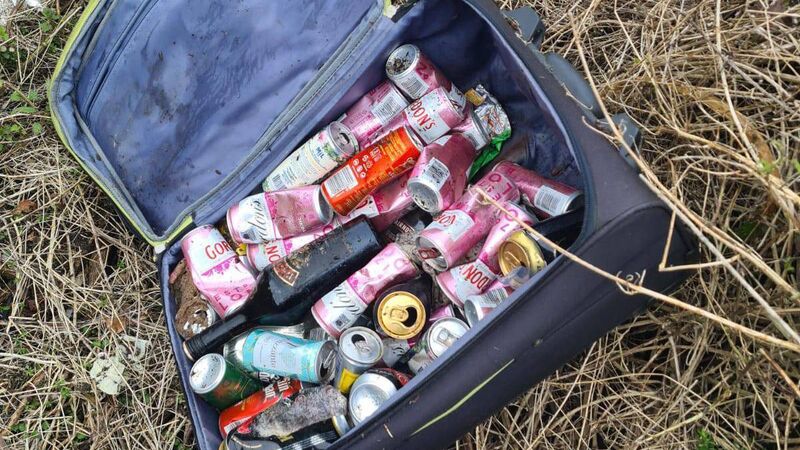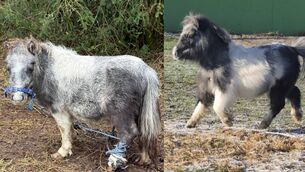Clean-up work just keeps going to waste; litter and dumping on the increase in Cork

Examples of litter cleared by Ringaskiddy Tidy Towns.
LITTER and dumping have grown in Cork city and county over the past year.
At a recent meeting, Cork City Council chief executive, Ann Doherty, said that these problems had intensified in the city area.
Littering is also costly for Cork County Council, with €400,000 spent by its environment department on clean-ups and on surveillance to prevent dumping.
Independent councillor Marcia D’Alton said this may be a fraction of the true cost, as a large portion of clean-ups is carried out by the roads department.
Ms D’Alton, from Passage West, said that it was frustrating to see so much money spent on cleaning up, instead of it being invested in tangible, community-based projects, such as playgrounds, youth centres, and gyms.
“The cost is astronomical; it is beyond reasonable,” Ms D’Alton said.
Apart from the environmental damage and the unsightliness of rubbish, the cost was a growing concern.
“It is hard to comprehend why people dump,” Ms D’Alton said. “But it would seem, even if there was no gate fee at civic-amenity sites, some people would litter.”
The councillor said that if we couldn’t even get people to dispose of their waste properly, there was little hope of tackling the bigger issues, such as climate change and the war on micro-plastics.
“This is a local, tangible issue,” Ms D’Alton said. “I have conversations about it on a daily basis and it is not just me noticing it.”
Ms D’Alton said that increased enforcement of litter fines and more litter wardens would be helpful, but also said the recently enacted legislation, allowing city and county officials to request evidential proof of appropriate waste disposal, needed to be implemented more readily.
Local responses to tackle litter

Ringaskiddy Tidy Towns was set up in March 2020, in response to litter being left behind on the coastal area’s beaches, such as Gobby Beach and Luck Beach.
Ringaskiddy Tidy Towns chairperson, Jamie O’Toole, said he never had any aspirations to run a Tidy Towns committee but found the rubbish on the beaches was so bad, he couldn’t stand idly by.
Mr O’Toole said that Ringaskiddy is on a bus route from the city and, over the past year, particularly during the good weather, groups of teenagers would make their way out and have beach parties, discarding everything from tents to cans and glass bottles.
What began as organised beach clean-ups soon became a Tidy Towns organisation, with volunteers giving their time to look after their local area.
Mr O’Toole described the waste-management problem as “mindboggling”.
“It’s insane,” Mr O’Toole said. “Where has the rubbish been going?”
Mr O’Toole said that the Tidy Towns committee goes out three to four times a week and has collected thousands of black bags of rubbish over the past year, since it was founded.
He said that a lot of coffee cups and face masks are picked up by the Tidy Towns volunteers.
“Every day, we are picking up coffee cups and face masks, often branded face masks from the local factories,” Mr O’Toole said.
The Tidy Towns committee has around 40 volunteers, who co-ordinate their efforts through a WhatsApp group and, this year, the organisation will be entering the Tidy Towns Competition for the first time since 2000.
A big problem in the Ringaskiddy area is the newly opened Haulbowline Park, which has no operating bins, and Mr O’Toole said it is becoming dirty.
“It is very sad to see. It is a very beautiful place and there are bags of dog poo just discarded beside sealed bins,” Mr O’Toole said.
The bins that were installed by the contractor are too big and require a hoist to empty them so as to be removed.
“The park is in the Cobh Municipal District and their policy is everyone is to take home their rubbish, but that is just fantasy land,” Mr O’Toole said.
He said it can be hard to see areas that were cleaned littered again within days, but said the benefits of being a part of a Tidy Towns group outweigh the downsides.
“The feedback is amazing, the village looks great, and the community spirit has been rejuvenated,” Mr O’Toole said.
The committee had organised a number of initiatives, including planting flowers in the village and hanging flower baskets.
In the city, St Luke’s and Mayfield Tidy Towns chairperson, Nano O’Connell, said a lack of bins on the northside leads to littering at busy areas, such as bus stops and outside shops.
Ms O’Connell, who has been chairperson for the past four years, since the organisation was set up, said that she enjoyed the volunteer work and the feedback, but that it can be disheartening to see areas recently cleaned covered in rubbish again.
Ms O’Connell said dog poo was a big problem, with plastic bags of collected poo thrown everywhere, including in ditches and hedges.
Ms O’Connell also said that since the pandemic began, the committee hasn’t met in groups or to gather litter together.

“Doing less has made me realise how important the work that we do is,” Ms O’Connell said. “I feel good about doing it and it helps.”
The St Luke’s/Mayfield Tidy Towns group have about 25 volunteers, who used to regularly give up their time to keep the community clean.
“We have locals of all ages involved,” Ms O’Connell said. “It is great to be a part of the Tidy Towns and to keep your area looking nice. I am very proud of our achievements and people acknowledge the work that we do. They appreciate it.”
Ms O’Connell said one deterrent to littering would be more litter wardens around the city.
“You don’t see them around and it would be nice if people thought twice about discarding their rubbish irresponsibly.”







 App?
App?


